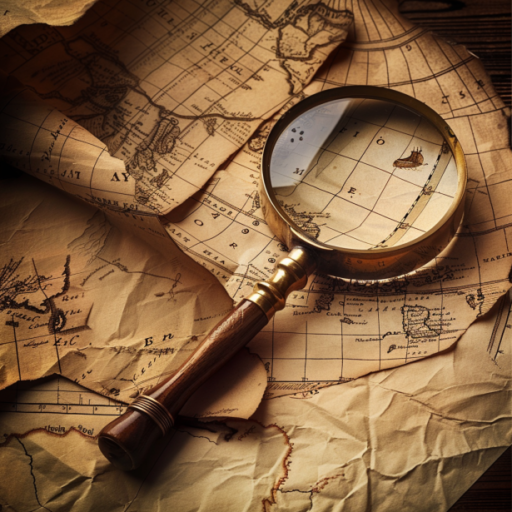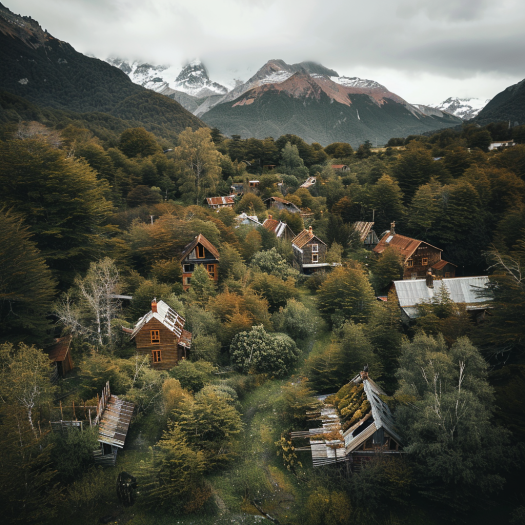Introduction
In the 1870s, a Swiss colony in Argentina’s Patagonia region mysteriously vanished without a trace. This lost village, established by Swiss immigrants seeking a new life in the remote and rugged terrain, was reportedly thriving before its sudden disappearance. Despite extensive searches and numerous theories, the fate of the villagers remains unknown. Some speculate that they succumbed to harsh weather conditions, while others suggest conflicts with indigenous tribes or even undiscovered natural disasters. The enigma of the lost Swiss village continues to intrigue historians and adventurers alike.
The Swiss Colony in Patagonia
Historical Background
- Swiss Immigration: During the 19th century, many Swiss immigrants sought new opportunities abroad. Patagonia, with its remote and uncharted landscapes, attracted a group of these settlers who hoped to build a prosperous community.
- Settlement Formation: The colony was established in the 1870s, aiming to create a thriving village in the challenging Patagonian environment. Initial reports indicated that the settlement was flourishing with successful farming and communal cooperation.
Life in the Colony
- Agriculture and Livestock: The settlers brought their agricultural expertise, cultivating crops and raising livestock suited to the harsh conditions of Patagonia.
- Community Structure: The village was built with typical Swiss efficiency, including homes, communal buildings, and infrastructure to support their agricultural endeavors.
The Mysterious Disappearance
Timeline of Events
- Prosperous Beginnings: Initially, the colony showed signs of success, with reports of robust agricultural production and a cohesive community.
- Sudden Disappearance: By the late 1870s, all traces of the village and its inhabitants had vanished. Searches conducted in subsequent years failed to find any evidence of what happened to the settlers.
Initial Searches and Findings
- Expeditions: Several expeditions were launched to locate the missing village, but they yielded no conclusive evidence. Remnants of buildings, tools, or personal belongings were never discovered, adding to the mystery.
- Oral Accounts: Local indigenous tribes had varying stories about the settlers, some suggesting conflicts, while others had no record of encountering the Swiss settlers at all.
Theories Behind the Disappearance
Harsh Weather Conditions
- Severe Climate: Patagonia’s extreme weather, including harsh winters and unpredictable storms, could have overwhelmed the settlers, leading to their demise.
- Isolation: The remote location meant that the settlers had limited access to outside help, which might have compounded their struggles against natural elements.
Conflict with Indigenous Tribes
- Possible Clashes: Some theories suggest that conflicts with indigenous tribes in the region could have led to the villagers’ disappearance. Disputes over land and resources may have escalated into violent encounters.
- Cultural Misunderstandings: Miscommunications and cultural differences might have led to tensions and eventual conflict between the settlers and indigenous peoples.
Natural Disasters
- Undiscovered Catastrophes: There is speculation that a natural disaster, such as an earthquake, landslide, or flooding, might have wiped out the village, leaving no trace behind.
- Geological Activity: The Patagonian region is known for its geological activity, which could have contributed to an unforeseen disaster impacting the settlers.
Other Speculative Theories
- Disease Outbreak: An epidemic could have rapidly decimated the population, leading to the abandonment of the village as survivors fled or perished.
- Voluntary Departure: Some propose that the settlers might have voluntarily left the area due to insurmountable challenges, relocating to a different part of Argentina or even returning to Europe.
Cultural Impact and Modern Exploration
Historians and Researchers
- Ongoing Interest: The mystery of the lost Swiss village continues to fascinate historians, who seek to uncover clues about the settlers’ fate through historical documents, oral histories, and archaeological investigations.
- Modern Expeditions: Adventurers and researchers still explore the Patagonian wilderness, hoping to find evidence that could explain the disappearance of the village.
Local Legends
- Folklore: The story of the lost Swiss village has become part of local folklore, with tales of ghostly apparitions and hidden treasures attracting curious visitors.
- Cultural Significance: The mystery contributes to the rich cultural tapestry of Patagonia, highlighting the region’s historical connections to European settlers.
Conclusion
The disappearance of the Swiss colony in Patagonia remains one of the great unsolved mysteries of the 19th century. Despite numerous theories ranging from environmental challenges and conflict to natural disasters and voluntary departure, the true fate of the settlers is still unknown. The lost village continues to captivate the imagination of historians, researchers, and adventurers, ensuring that the enigma of the Swiss settlers in Patagonia endures.
FAQs
What happened to the Swiss colony in Patagonia?
The Swiss colony in Patagonia, established in the 1870s, mysteriously vanished without a trace. Despite extensive searches, no conclusive evidence has been found to explain their disappearance.
What are some theories about the disappearance of the village?
Theories include harsh weather conditions, conflict with indigenous tribes, natural disasters, disease outbreaks, and voluntary departure due to insurmountable challenges.
Have any remains or evidence been found?
No significant remains or evidence have been discovered, despite numerous searches and expeditions. The exact fate of the settlers remains unknown.
Why did the Swiss settlers choose Patagonia?
Patagonia offered the promise of new opportunities and uncharted lands for the Swiss settlers seeking to establish a prosperous community in a remote region.
How does the mystery impact local culture?
The story of the lost Swiss village has become part of local folklore and cultural heritage, attracting interest from historians, adventurers, and tourists.
Are there ongoing efforts to solve the mystery?
Yes, modern researchers and adventurers continue to explore the Patagonian wilderness, hoping to find clues that could shed light on the disappearance of the Swiss colony.

